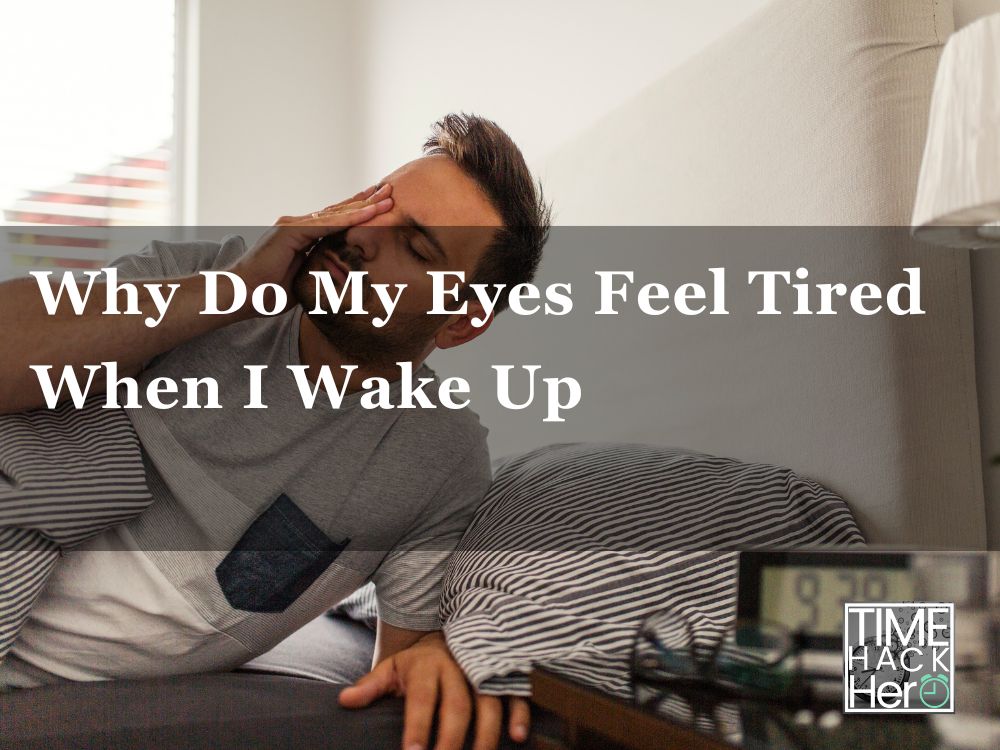You go to bed feeling exhausted and hoping for a restful night’s sleep, only to be greeted by dry, irritated, heavy eyes when your alarm rudely awakens you. Why do your eyes often feel tired rather than rejuvenated in the mornings?
This article explores the common reasons morning eye fatigue happens. It looks at potential effects on vision, productivity, and wellbeing. Finally, you’ll find suggested solutions to help address the root causes so you can open your eyes feeling refreshed and ready to take on the day.
Table of Contents
Is This Normal?
Occasionally waking up with tired eyes after a poor night’s sleep or very late night is normal. But regularly feeling eye fatigue in the morning often points to an underlying issue.
Signs that morning eye tiredness may be abnormal:
- Daily heavy, dry, irritated eyes upon waking
- Consistent pain or soreness around the eyes
- Blurry vision when you first open your eyes
- Excessive watering, mucus, or styes in eyes
While minor or sporadic eye discomfort upon waking is expected, persistent exhausted eyes daily signifies a problem requiring intervention.
Common Culprits Behind Morning Eye Fatigue
Here are some of the most likely explanations for waking up with tired eyes:
1. Inadequate Sleep
Not getting enough sleep is a prevalent reason your eyes remain exhausted upon waking. Adults need 7-9 hours of quality sleep per night. Consistently falling short leaves your eyes without enough time to fully restore overnight.
Your eyes undergo important recovery processes during sleep. Lack of sufficient sleep disrupts these rejuvenating steps:
- Cleaning of tear film – Tears flush away ocular debris accumulated during the day.
- Rehydration of eyes – Tears replenish moisture to dry eyes.
- Rest to ciliary muscles – These control lens shape for sharp vision.
- Removal of free radicals – Antioxidants repair eye cell damage from light and stress.
Aim for enough nightly sleep to let your eyes fully refresh.
2. Poor Sleep Quality
Even if you spend enough time asleep, poor sleep quality prevents your eyes from reviving overnight. Sleep disorders like insomnia or sleep apnea lead to restless, fragmented sleep that never allows your eyes to fully relax in deep restorative stages.
Stimulants like caffeine or electronics before bed can also impair sleep quality. Prioritize sleep hygiene for more rejuvenating rest so your eyes feel vibrant upon waking.
3. Dehydration
Dehydration is a major contributor to waking up with dry, irritated eyes. When your body lacks sufficient water, your eyes cannot produce enough cleansing tears overnight. Drink plenty of fluids daily and keep water by your bed to stay hydrated.
Caffeine and alcohol are diuretics that promote dehydration. Limit these prior to bed to prevent waking with parched eyes.
4. Medications
Certain prescription and over-the-counter medications like antihistamines, diuretics, beta blockers, antidepressants, stimulants and others list dry eye or vision changes as potential side effects.
If your waking eye fatigue seemed to start after beginning a new medication, talk to your doctor about adjusting the timing, dosage or type of drug. Don’t abruptly stop medication without your doctor’s guidance.
5. Environment
Aspects of your sleep environment may cause irritation that leaves your eyes feeling fatigued upon waking:
- Dry air from heating or fans
- Drafts from windows or air conditioning
- Dust, pet dander or other allergens
- Irritants from detergents or fabric softeners on linens
- Sleeping face down in the pillow
Evaluate your environment for offenders and optimize conditions for healthy eyes.
6. Age
Advancing age causes anatomical changes and decreased tear production that make dry, tired eyes more likely, especially after 50. Lubricating drops can help combat age-related dryness.
7. Digital Eye Strain
Overuse of screens before bed strains your eyes. Prolonged reading, computer work, or TV viewing stresses the focusing muscles and dries the eyes’ surface. Follow the “20-20-20 rule” – take a 20 second break every 20 minutes to view something 20 feet away.
8. Contact Lens Wear
Sleeping in contacts not designed for overnight wear can cause discomfort, abrasions, and inflammation. Use daily disposables if you must sleep in lenses. Give your eyes a break on nights without lenses. Proper lens hygiene also reduces irritation.
9. Refractive Errors
Uncorrected vision problems like nearsightedness, farsightedness, astigmatism or presbyopia lead to eye strain. Ensure your prescription is current. Upgrade your eyeglasses, change contact lens brand or consider laser eye surgery.
10. Eye Injury or Infection
Injuries like corneal abrasions and infections like conjunctivitis cause eye irritation, especially upon waking. See an optometrist or ophthalmologist if you suspect an eye problem.
11. Blepharitis
This common chronic inflammation of the eyelids triggers irritation, redness and burning. Proper lid hygiene helps control symptoms.
12. Allergies
Seasonal allergies or eye allergies cause congestion, swelling and watery eyes. Take oral antihistamines before bed to manage allergies. Wash bedding weekly in hot water to remove allergens.
Pay attention to your daily habits and environment to pinpoint anything that could be imposing fatigue and discomfort upon waking.
Effects of Chronic Morning Eye Fatigue
Ongoing eye tiredness and irritation during mornings has many detrimental effects:
Physical Effects
- Eye infection risk from excessive rubbing and touching
- Headaches triggered by eye strain
- Light sensitivity and increased eye watering
- Vision problems from cornea damage
Mental Effects
- Increased anxiety about underlying eye issues
- Low mood from discomfort and appearance concerns
- Cognitive impacts from vision disturbances
- Poor concentration and focus
Daily Life Effects
- Reading and driving difficulties
- Limited screen use
- Avoiding social interactions
- Difficulty exercising or completing tasks
Work/School Impacts
- Learning and productivity struggles
- Increased errors and accidents
- Calling out of work/school to rest eyes
Clearly, determining the source of morning eye fatigue and treating it is critical for your vision, mental health, performance, and overall well-being.
How to Reduce Morning Eye Tiredness
If you regularly wake up with exhausted eyes and irritation, try these methods:
Rule Out Medical Causes
See an optometrist or ophthalmologist to check for infections, dry eye, blepharitis or other issues causing morning symptoms. Treating conditions improves eye comfort.
Practice Good Sleep Hygiene
Follow regular sleep and wake times. Ensure the bedroom is dark and cool. Avoid electronics before bed. Use blackout curtains or sleep masks. Getting quality sleep lets eyes fully recharge.
Reduce Eye Strain
Limit screen time before bed. Take frequent breaks during device use. Position screens below eye level. Use proper lighting when reading in the evenings. This minimizes ocular exhaustion.
Increase Lubricating Eye Drops
Addressing dry eyes eases morning discomfort. Use moisturizing, preservative-free eye drops before bed and upon waking to lubricate eyes. Choosing gel drops provides longer moisturization while sleeping.
Drink More Water
Staying hydrated is key for overall health but especially for reducing eye dryness and fatigue. Drink the recommended amount of water based on your weight. Avoid alcohol and limit caffeine.
Manage Allergies
Allergic reactions to dust, pet dander, pollen or mold can inflame eyes overnight. Control home allergens by washing bedding regularly. Consider over-the-counter antihistamines before bed to reduce reactions.
With a multi-pronged approach targeting medical issues, sleep habits, eye strain, hydration, and allergies, you can hydrate your eyes and awaken feeling ready to take on the day with refreshed vision.
When to See an Eye Doctor
Make an appointment with your optometrist or ophthalmologist if you experience:
- Fatigue and irritation persisting for weeks despite proper sleep and eye rest
- Redness, swelling, pain or discharge in the eyes
- Light sensitivity, vision changes or loss of vision
- Waking up with eyes glued shut from discharge
- Recurring styes or chalazia bumps on eyelids
- Headaches frequently accompanying eye fatigue
Professional eye exams are crucial for identifying any ocular abnormalities or health conditions requiring treatment, like infections, inflammation, dry eye, or vision problems. Prompt evaluation ensures your eyes get the care they need.
Prioritize healthy sleep and eye care habits to prevent waking up with tired eyes. But see an eye doctor right away if symptoms persist to address any underlying issues leaving your eyes feeling less than refreshed.
Frequently Asked Questions
1. Why are my eyes so tired when I open them in the morning?
Common causes include not getting enough sleep or enough REM/deep sleep, eye strain from electronics use before bed, dehydration overnight, environmental allergies, age-related dryness, side effects of medications, and eye conditions like dry eye disease or blepharitis.
2. How can I make my tired eyes feel better in the morning?
Splash cool water on your face and over closed eyelids, apply preservative-free lubricating eye drops, gently massage the eyelids, do eye stretches/yoga poses, drink a glass of water, take a cool shower, use a warm compress, and avoid screen use right after waking up.
3. Should I see a doctor for morning eye tiredness?
Yes, if you consistently wake up with irritated, painful, dry, red, or blurry vision, make an appointment with an ophthalmologist. They can check for underlying issues like infections, dry eye, allergies or other conditions and provide prescription treatments to relieve symptoms.
4. Does lack of sleep cause eye fatigue in the morning?
Absolutely. Sleep deprivation reduces tear production and causes fluid loss in the eyes. Lack of REM and deep NREM sleep stages also fails to adequately rest and restore eye muscles. Aim for 7-9 hours of quality sleep consistently so eyes feel refreshed upon waking.
5. Can dehydration cause morning eye tiredness?
Yes, not getting enough fluids causes the eyes’ protective tear film to dry out, leading to irritation. Drink the recommended daily water intake for your weight, limit diuretics like caffeine, and use moisturizing eye drops before bed to ensure eyes stay hydrated overnight.
Conclusion
In summary, dryness, allergens, strain, inadequate sleep, dehydration, aging, and eye disorders can exhaust eyes overnight. Determining the cause of morning eye fatigue allows specific lifestyle changes, medical treatment if indicated, and targeted relief strategies like hydrating eye drops to banish eye tiredness, so your eyes feel ready to take on the day.









